Embedding Traditional Knowledge About Diet and Health Into Learning Resources
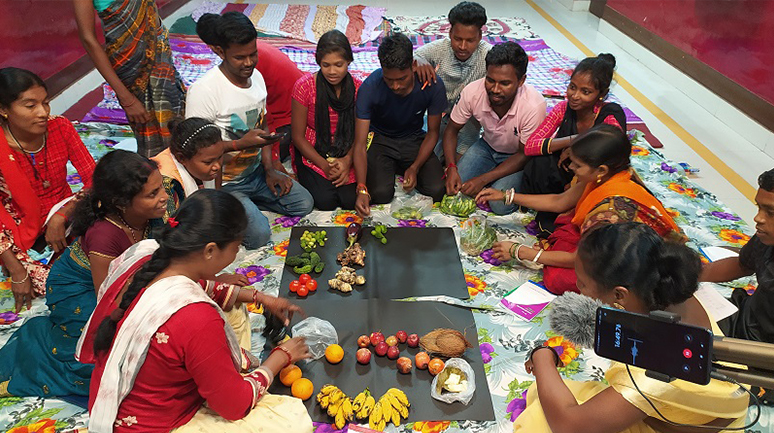
The Sustainable Food Systems project aims to address food and nutrition security alongside gender equality in the poorest regions of India and seeks to increase dialogue around diet and health and share knowledge. One way to enable communities to reclaim traditional knowledge about diet and health is through curriculum development. The project partners have created new learning resources for tribal youth, university students and professional practitioners, and are working with education providers and state departments to enable institutional uptake.
Developing a series of interactive workshops for tribal youth
P roject partner PRADAN has developed a seven-module curriculum on Sustainable Food Systems. The curriculum is designed as an experiential learning process. Each module consists of a series of workshops that enable participants to critically examine and reflect on their experiences, choices, local and cultural contexts through guided discussions and dialogue. A rich range of resources are used to make the sessions interactive and engaging, including videos, pictures, exposure visits, and mapping exercises.
The modules aim to:
- Create an awareness of dietary diversity in ensuring good health
- Examine the role of indigenous knowledge and traditional food practices in contributing towards dietary diversity
- Critically examine gender inequality within household in terms of access food and nutrition
- Understand the role of indigenous/traditional knowledge in contributing towards food/nutrition security and sustainability
- Reflect on food choices and practices that can promote sustainable food system

Tribal youth participate in a workshop about diet diversity and health
The modules were piloted with 17 young people over 10 days during August and September 2021. The participants included Lahanti Club (local youth club) volunteers, Self Help Group volunteers and PRADAN health mentors.
Young people participated enthusiastically in the activities and discussions were engaging and intense. They reflected on how they could revive local economy and ecology as well as fulfil their dreams of being successful by making more informed choices and being the agents of change.
Participants said the sessions helped them to understand the shift happening in agricultural patterns, food production and consumption. Many women shared that as a result, they had been bold enough to speak to market vendors about where the food comes from.
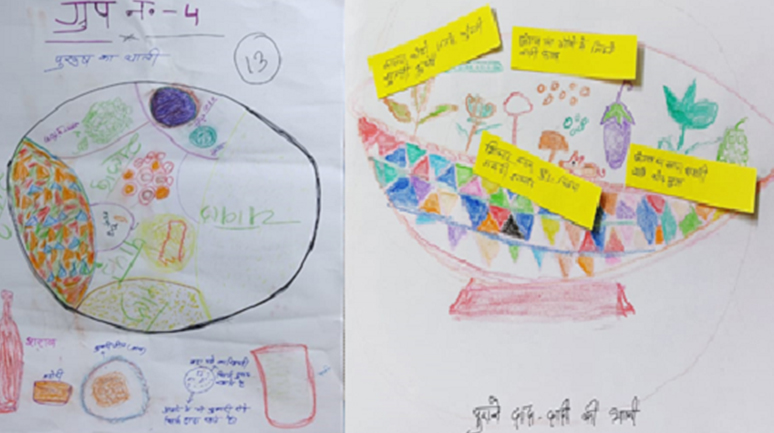
Drawings from the workshops, showing locally sourced and seasonal foods
‘When I compared the pictures of food plates that my grandparents used to eat, with what I eat, I found that their plates were more colourful rich in diverse foods. They used to source some of the food from the forest. Their health was much better. I need to include more uncultivated food in my diet. We also saw the difference between food plates of men and women’ Kavita, Lahanti Club Volunteer.
‘The platter will have more nutrients and diversity if it has more colors. Our sources need to be diversified. Market, Uncultivated, Cultivated and Government schemes provide us different types of foods belonging to different food groups.’ Suboni, Lahanti Club Volunteer
‘The activity on mapping the sources of food was revealing. We grow onions locally, yet we buy onions in the market, that are grown in and brought from Nasik. I wonder why this is and how can we change this?’ Khushbu, Lahanti Club Volunteer
One lesson from the pilot is that the resources need to be available in both Hindi and Santhali languages, which the team are now organising. Going forward, PRADAN will showcase this with the State government and explore other platforms to engage further young people with the modules.
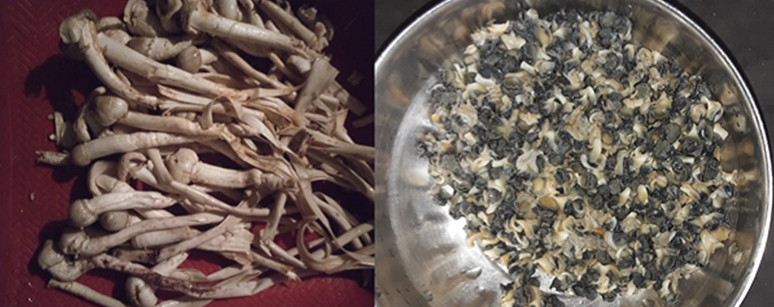
Locally foraged foods (wild mushrooms and snails) collected as part of the Identity, Culture and Food workshop
Integrating traditional knowledge into a mainstream graduate programme
P roject partner Kalinga Institute of Social Sciences (KISS) is a university in Odisha, India, and is therefore well placed to deliver graduate level learning resources. KISS have incorporated learning from the Sustainable Food Systems project into their curriculum on a range of postgraduate courses, from tribal sciences to zoology and botany.
The revised curriculum provides an overall understanding of food production and consumption in rural India with an emphasis on indigenous knowledge and practices. The importance of a balanced diet, deficiency disorders, and dietary requirements has been elaborated and the courses highlight how locally available food items can contribute to a sustainable future. The importance of traditional knowledge in terms of collecting, processing and storing local food items from indigenous areas is also emphasised. Concepts of food systems and sustainability have been included in the syllabus which allows students to understand food security from a global perspective.
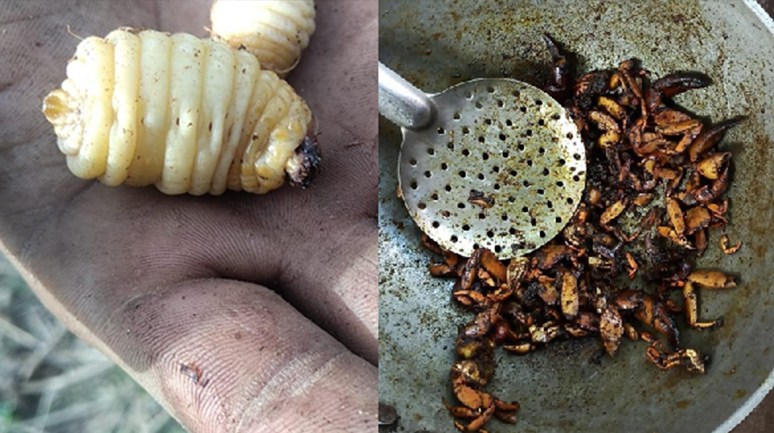
Indigenous foods (weevil larva and crab) collected through participatory filming
KISS have also started a course on Food Science and Technology in 2021-2022 across four semesters. The first semester begins with basics in food and nutrition concepts including indigenous health and nutrition. The following three semesters will deliver in-depth learning on food analysis, preservation, storage, modern concepts of nutraceuticals and sustainable management of tribal natural resources. The final semester has a component of field work where the students create short films on various themes on consumption practices and traditional food items. Participant films have been used to successfully document practices of food consumption among the indigenous population through the project, and this learning will be harnessed for the fieldwork in this module.
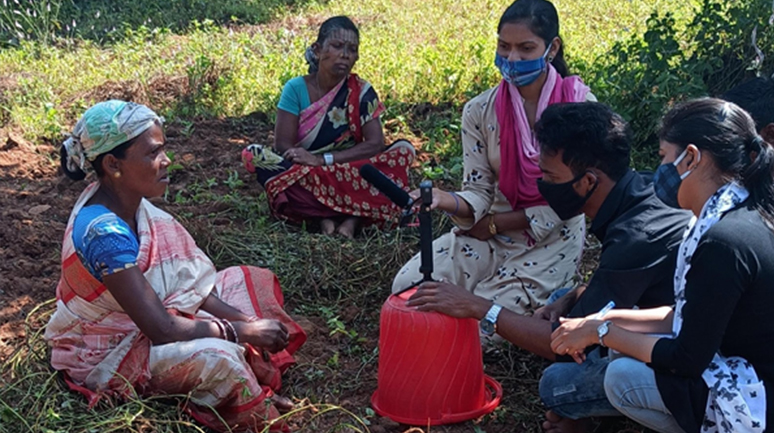
Participatory filming facilitated by project partner KISS
The project partners at KISS are now working to adapt and simplify the topics in food and nutrition in a rural context and in tribal dialects to provide sessions for school children.
Providing free online learning for practitioners across India
T he Sustainable Food Systems project partners collaborated with experts from a range of Indian institutions to create a Massive Open Online Course called ‘Creative Communication, Extension and Community Resource Management for Sustainable Development’. The course launched in September 2021 and is hosted by Indira Gandhi National Open University (IGNOU). So far, over 550 learners have enrolled. The target audience is postgraduate researchers, academics and frontline extension workers from NGOs and government.
The course aims to equip learners with knowledge and skills on the latest creative tools in extension, training and advocacy, to address the wellbeing and empowerment of rural and urban communities, especially women and children. The teaching includes examples from the Sustainable Food Systems project, which has worked extensively in indigenous communities practicing participatory methods for research and development.
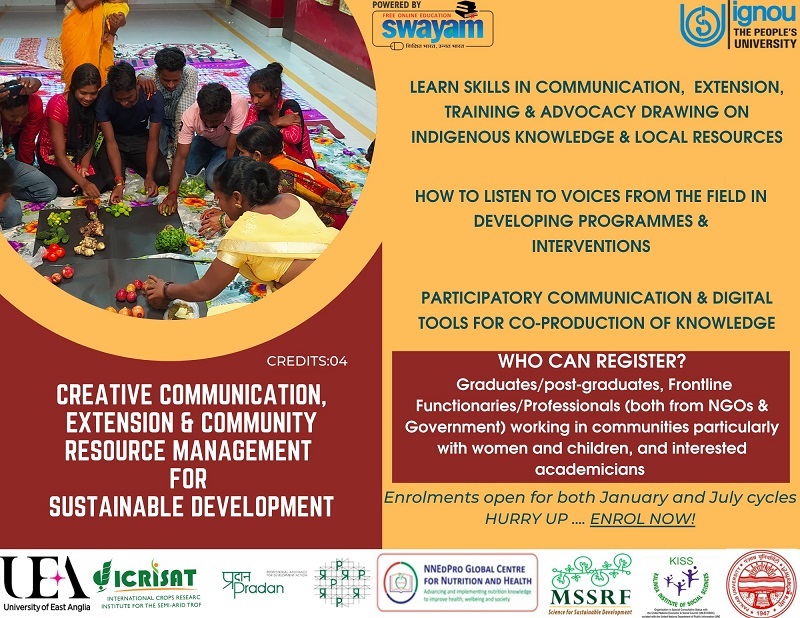
A flyer for the MOOC
Conclusion
Given the diversity of India and its food systems, a key objective of the Sustainable Food Systems project was to create contextually relevant curricula, delivered at a variety of scales from the local to the national. The project partners have used the funding and opportunity provided by the project to produce engaging workshops for tribal youth, embed traditional knowledge within postgraduate teaching and bring the latest good practice to national government and NGO frontline workers.
This blog was written on 23 November 2021 by Hannah Gray (GRTA Project Officer, UEA), Chandni Khanduja (Education specialist from Azim Premji University, India), and Shubhasree Shankar and Birendra Suna (KISS, India) and is published on the website of University of East Anglia.

